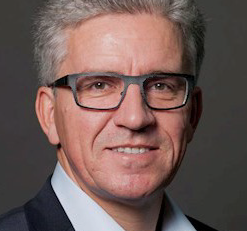Dialogues on the business Ecosystem
Date: 22 May, Monday.
Time: 09:00 – 11:30 (1.5 Hours)
Place: Sinnergiak Social Innovation (UPV/EHU). Elvira Zipitria, Paseo Ondarreta 18. Donostia-San Sebastián
Description of the Session:
Digitisation and robotisation are a clear challenge for the organisational structures and operative practices of companies and work centres. In the intensive knowledge economy, the technological revolution and advanced manufacturing are a phenomenon that fosters and creates new opportunities in the territorial business ecosystem.
In this respect, the concept of workplace innovation emerges as a response through the integration of technology, the participation of workers and the organisation of work from a new and comprehensive perspective

Steven Dhondt
Senior Research Scientist & Visiting Professor. TNO (Senior Research Scientist) – The Netherlands | KU Leuven (Visiting Professor) (Belgium)Steven Dhondt (Prof., PhD) has a doctoral degree in social sciences and is currently senior researcher at TNO and visiting professor at the University of Leuven (Belgium). He specialises in the field of organisation, work, technology and health. His aim is to help companies build better organisations by showing how they can rely on the expertise of their co-workers. Currently, he is managing the European learning network on Workplace Innovation. He has developed the network of more than 7,000 company contacts all over Europe for the European Commission (DG GROW) and is now developing the network to serve companies, policy makers and social partners in all Member States. He is also responsible for the Dutch Knowledge Bank on Workplace Innovation with more than 800 case studies (www.workplaceinnovation.org).

Claudio Zettel
Head of Workplace Innovation. Project Management Agency at the German Aerospace Center (Germany)Dr. Claudio Zettel is geographer and economic sociologist. At the Project Management Agency DLR-PT he leads the unit “Innovative work design and services”. Mandated by the Federal Ministry of Education and Research he coordinated the national programmes “Future of Work” and “Working -learning- developing competences: Innovation capability in a modern working world”. Within these programmes, he advised the Ministry and built up several research clusters e.g. in the area of corporate culture, innovation strategies or the digitalization of work. Own research projects on the informal sector led him to Brazil, Chile and Peru, where he also worked as lecturer at different universities. In the 1990th, he advised the Brazilian government in restructuring their national vocational system. His research priorities are the effects of digitalisation to labour and work organisation (Arbeit 4.0), innovation strategies, demography and R&D policy management.

